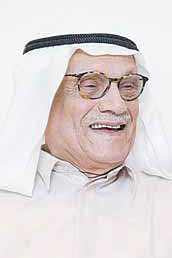 Dr Saleh Al-Ojairi
Dr Saleh Al-OjairiKUWAIT: Astronomer Dr Saleh Al-Ojairi said the first day of Ramadan would fall on Monday, June 6. The fasting period will be 15 hours and 37 minutes long, and the non-fasting period would be 8 hours and 23 minutes long. Ojairi added that the Ramadan crescent would appear at 10:59 am and will still be visible for 17 minutes after sunset on Sunday, June 5. He also predicted that this year's Ramadan would be 30 days long and that the longest day would be Wednesday, June 22.
Construction violations
Municipal Council's Deputy Chairman Meshaal Al-Juwaisri stressed that everybody approves of equality in law enforcement concerning construction violations, but stressed that the municipality should enforce the law equally without any 'wasta' (connections) or turning blind eyes to violations committed by influential people. Juwaisri also urged the municipality to check construction violations in investment (apartments) and commercial (shops) areas first before private areas (houses).
He also urged the municipality to warn violators before disconnecting the power. "Many citizens have gone to court and the court ordered reconnecting their power supply, so why is the municipality carrying on with actions that might cost it considerable amounts of money to pay in compensation after losing those cases?" he wondered, defending the construction violations committed by citizens over the government's failure in solving the housing problem.
Barayeh city
The Municipal Council's technical committee yesterday held a workshop presided by member Fahd Al-Sane to discuss the Barayeh city project. The workshop was also attended by representatives from the Ministry of Public Works (MPW), Kuwait Municipality, the Public Authority for Housing Welfare (PAHW) and the initiatives apparatus, who all took part in discussing the benefits of building the new city. Sane explained that the city would be built over an area of 35 million sq m in southern Kuwait and opposite Sabah Al-Ahmad City.
He added that according to plans, 45 percent of the city would be allocated for private residences (in 13 residential blocks), 7 percent for investment residences in five blocks and 3 percent for a central park, while the remaining area would be used for commercial uses, public facilities, a university (to be built over an area of one million square meters) and an alternative power research center.
Sane explained that the city would be self-sufficient in terms of labor and job opportunities. He added that it would accommodate 85,000 people and that once construction commences, the project would be completed in three years. "The city will include 17,000 housing units and houses will be built over an area of 400 square meters," he explained.
The name Barayeh is the plural of Baraha (open yard in Arabic), and that he was inspired by the way old Kuwait was built. The city will be highly dependent on modern technology, namely in generating over 85 percent of the power it would need. An artificial lake will be dug to hold processed recycled water that would be used for irrigation.
By Meshaal Al-Enezi










